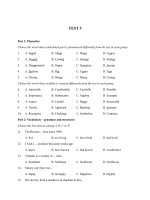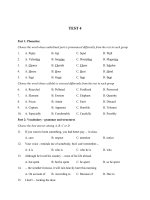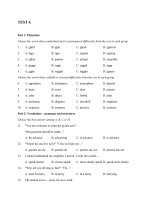Đề thi thử đại học môn Tiếng anh 2915 (6)
Bạn đang xem bản rút gọn của tài liệu. Xem và tải ngay bản đầy đủ của tài liệu tại đây (93.06 KB, 6 trang )
TEST 6
Part 1: Phonetics:
Choose the word whose underlined part is pronounced differently from the rest in each group
1. A. child B. chin C. check D. chemist
2. A. bury B. turn C. curtain D. cursing
3. A. editor B. entrust C. advent D. assemble
4. A. group B. coup C. cough D. soup
5. A. eight B. weight C. freight D. leisure
Choose the word whose syllable is stressed differently from the rest in each group
6. A. apprentice B. attendance C. atmosphere D. deposit
7. A. basic B. extra C. duty D. mature
8. A. offer B. direct C. forbid D. infer
9. A. mechanic B. diagram C. downhill D. emphasis
10. A. sequence B. sentence C. practice D. resource
Part 2: Vocabulary - grammar and structures
Choose the best answer among A, B, C or D
11. "You are welcome to order the goods now".
"But payment should be made "
A. for advance B. advancing C. in advance D. to advance
12. "Where do you live now?" "I live in Utah; my "
A. parents too do B. parents do C. parents do, too D. parents also do
13. I cannot understand my neighbor’s accent. I wish she would
A. speak clearer B. clearer speak C. more clearly speak D. speak more clearly
14. "Why are you driving so fast?" "I'm "
A. must be hurry B. in hurry C. in a hurry D. hurrying
15. The station is too away for us to walk.
A. long B. far C. short D. distant
16. I have your music CD. I think I your concert video.
A. also have B. have too C. too have D. have further
17. I hear you have started a new job. like it?
A. How do you B. How C. What D. What do you
18. The football team won partly because they had been trained by their
A. teacher B. director C. instructor D. coach
19. I ready have to go now. I have the doctor.
A. appointments to B. an appointment to C. appointment with D. an appointment with
20. I can meet you at Central Station. Will ?
A. convenient for you B. that convenient
C. that be convenient D. you be convenient
21. "Where last weekend?" "I went to see my aunt and uncle".
A. are you go B. do you go C. have you went D. did you go
22. I was very surprises that she didn't pass the exam".
A. hearing B. to hearing C. at hearing D. to hear
23. "Why she isn't speaking to us?"
"We must have done something that upset her. She is just too sensitive".
A. are you think B. are you imagine C. do you think D. you think
24. I hope that this winter won't be last.
A. as cold than B. so cold as C. as cold like D. so cold like
25. Sorry to be late. I was delayed by
A. a heavy traffic B. heavy traffic C. some heavy traffic D. traffic being heavy
Which sentence expresses the same idea as the given one?
26. Tom can run faster than Jim.
A. Tim can run less fast than Tom
B. Tim can run as not fast as Tom
C. Tim cannot run as fast as Tom
D. Tim can run slower than Tom
27. I wish my English were good enough to go for the interview.
A. My English is too good to go for an interview
B. My English is good enough to go for an interview.
C. If only my English were good enough for me to go for the interview.
D. My English was good enough and I could go for the interview.
28. The fare of my airline ticket costs more than the hotel.
A. The face of my airline ticket costs more than the hotel does.
B. The face of my airline ticket costs more than any hotel.
C. The face of my airline ticket costs more than the price of the hotel.
D. The face which I paid for my airline ticket is cheaper than the hotel.
29. I regret going to bed so late last night.
A. I wish I didn't go to bed so late last night
B. I wish I went to bed early last night.
C. I wish I hadn't gone to bed so late last night.
D. I wish I had gone to bed early last night.
30. Unlike my sister, I exercise every day.
A. My sister exercises every day but I don't
B. My sister and I exercise every day.
C. I exercise every day but my sister doesn't
D. I don’t like my sister to exercise
Choose a word or phrase in each sentence that needs correcting
31. Mr. Brown agreed (A) to let Tom (B) to work in (C) a department store for (D) a few
hours a week.
32. Smoking (A) is not (B) good (C) to (D) very often.
33. He (A) has been (B) absent (C) at school (D) very often.
34. We (A) didn't see the (B) Browns (C) recently. (D) They must go abroad.
35. Let's (A) go out for a (B) drink. - No, I suggest (C) staying at home & (D) watch TV.
Part 3: Reading
Read the passages below and choose the correct answer among A, B, C or D.
Australia is a big country, but nearly all Australians live near the sea. On hot summer days
you can see thousands of people at the beach. Many beaches have waves that are very high.
These large waves are known as surf and the people who ride them are called surfers. Surfing is
a skill and needs learning. Don't expect to be able to surf properly the first time you try.
However, by practicing a few times you will learn how to do it.
Surfing is not a new sport. Perhaps its origins need explaining. It started hundreds of years
ago in Hawaii. Men swam out to sea to catch fish and found they could come back to land very
quickly by riding the waves. These first surfers did not use a board. They were "body surfers".
Many people still do this type of surfing today.
After a while, people started to use boards and rode the waves by lying, kneeling or
standing on them. These first surfboards were made of wood and the water made them not after a
while. Today surfboards are made of plastic or fiberglass instead.
36. Surf is
A. waves that are on the high sea B. waves breaking on the ship
C. high waves breaking n the seashore D. high and small waves
37. Surfing is a skill and therefore
A. it is not easy to do it B. it is impossible to practice it
C. it is dangerous to do it D. it needs practice from day to day
38. Surfing started
A. five decades ago in Hawaii B. hundreds of years ago in Australia
C. long ago in Australia D. in Hawaii
39. Men of long ago did surfing by
A. using their bodies B. using a board
C. using fishing boats D. riding the waves on water skis
40. At first men did surfing
A. because it was an interesting sport
B. because it was a quick way to come back to land after catching fish
C. because the fishermen wanted to keep fit.
D. because there wasn't any board at that time.
THE INFLUENCE OF ALEXANDER GRAHAM BELL
Alexander Graham Bell invented the telephone and became a very famous man. He also
wrote an article which he presented in 1883. His research paper was about deaf people.
In his article, Dr. Bell explained why there were so many deaf children. He believed that
when deaf adults married each other, they would have (41) children. He thought that this
was bad. Bell blamed the schools for the deaf for causing marriages between deaf people. He did
not like the idea of these intermarriages and tried to think of ways to (42) them. He would
have preferred that deaf children be taught at hearing schools. He did not (43) schools or the
deaf. Bell felt that deaf people would not mix with hearing people if they went to (44)
schools.
Bell was (45) about other things, too. He noticed that deaf people socialized with
other deaf people. He felt that socializing with other deaf people was bad. Deaf people should
socialize with hearing people, he thought. bell tried to start a new law that would make it illegal
for deaf people to marry each other. He (46) up his idea when he realized that such a law
could not be enforced.
Bell also had strong feelings about the (47) of deaf children. He wanted deaf children
to be with hearing children in school. He thought that the deaf children could learn normal
behavior from the hearing children. Bell was against the use of deaf teachers, too, because he
thought this added to the (48) of a deaf "race" in America.
Bell had another theory, which he never proved. He believed that deaf children who signed
would not have good English (49) He could never prove this, and now many people have
tried to prove the opposite! A lot of new research shows that many deaf children whose parents
sign (and are deaf) do (50) schoolwork than deaf children who do not sign at home!
41. A. blind B. dumb C. deaf D. dead
42. A. stop B. support C. help D. encourage
43. A. observe B. describe C. support D. visit
44. A. larger B. separate C. nicer D. worse
45. A. selfish B. upset C. shy D. careless
46. A. fixed B. gave C. wrote D. talked
47. A. discipline B. health C. safety D. education
48. A. ability B. loss C. problem D. cost
49. A. skills B. language C. knowledge D. vocabulary
50. A. better B. more C. easier D. slower
Keys
1. D 2. A 3. B 4. C 5. D 6. C 7. D 8. A 9. A 10. D
11. C 12. C 13. D 14. C 15. B 16. A 17. A 18. D 19. D 20. C
21. D 22. C 23. C 24. B 25. B 26. C 27. C 28. A 29. C 30. C
31. B 32. C 33. C 34. A 35. D 36. C 37. A 38. D 39. A 40. B
41. C 42. A 43. C 44. B 45. B 46. B 47. D 48. C 49. A 50. A









